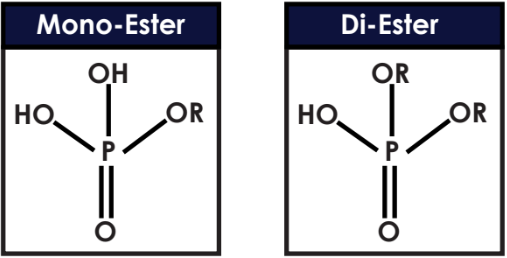Enhanced TDS
Identification & Functionality
- Agrochemical Functions
- Cleaning Ingredients Functions
- Technologies
- Product Families
- Chemical Structure of Phosphate Esters

Features & Benefits
- Labeling Claims
- Agrochemicals Features
- HII Features
- Background on Phosphate Esters
- Phosphate Esters are anionic surface active agents produced by reacting polyphosphoric acid or phosphorous pentoxide with molecules containing hydroxyl groups - commonly ethoxylated moieties or alcohols. Reactions using phosphorous pentoxide result in a mix of mono and di-esters, while products made with polyphosphoric acid are high in mono-ester yield.
- Which type to use depends upon the properties needed in formulation. Mixed esters products are generally better for emulsification; whereas, mono- ester rich exhibit better hydrotroping properties.
Applications & Uses
- Markets
- Applications
- Home Care Applications
- I&I Cleaning Applications
- Product Applications
- Blending 10% T-Mulz® 734-2KS, 16% NaOH , and 73% water produces a gel that is applicable in oven cleaners and heavy-duty oil and fat degreasers.
- This product is also used in the agricultural market as is or blended with other surfactants to make tank additive fertilizer compatibility agents. It meets 40 CFR 180.1001 (c), (d), and (e).
Properties
- Physical Form
- Appearance
- Clear, amber liquid
- Soluble in
- Water
- Typical Properties
Value Units Test Method / Conditions lonogenic Class Anionic - - Caustic Solubility (in 18% NaOH at 25°C) 18.0 - - Acid Values Neutral - - pH (at 5% aqueous Solution) 7.0 - 8.0 - - Specific Gravity (at 20 °C) 1.12 - - pH (at 1% Aqueous) 7.0 - 8.0 - - Weight (at 20°C) 9.33 lbs/gal - Moisture Content max. 45.0 % - Pour Point -12.0 °C - Activity 35.0 % - Hydrophobe Alkyl Phenol Ethoxylate - Electrolyte Stability
1% T-Mulz® 734-2KS is clear and soluble in an aqueous solution containing 16% NaOH at 25°C (77°F).
Regulatory & Compliance
Packaging & Availability
- Supplied by
Storage & Handling
- Storage & Handling Information
This product should be stored in stainless steel, lined, or plastic vessels.
